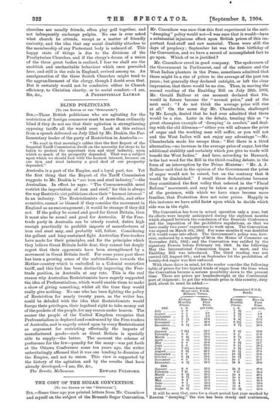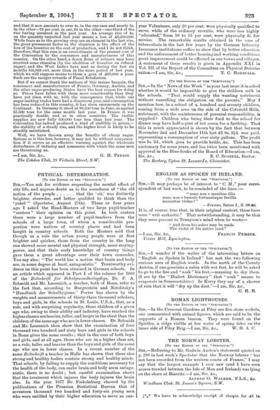THE COST OF THE SUGAR CONVENTION. [To THE EDITOR OF
THE " SPECT•TOR.1 SIR,—Some time ago you printed letters from Mr. Czarnikow and myself on the subject of the Brussels Sugar Convention. Mr. Czarnikow was sure that this first experiment in the anti- " dumping " policy would not—I was sure that it would—have a substantial injurious effect upon British prices of this im- portant food-stuff and raw material. Those were still the days of prophecy ; September 1st was the first birthday of the Convention, and we have a record of accomplished fact to go upon. Which of us is justified?
Mr. Czarnikow erred in good company. The spokesmen of the Government in Parliament, and of the refiners and the West Indian planters in the Press, sometimes admitted that there might be a rise of prices to the average of the past ten years ; but generally they declared outright, or left the clear impression, that there would be no rise. Thus, in moving the second reading of the Enabling Bill on July 28th, 1903, Mr. Gerald Balfour at one moment declared that 10s.
would in future become the "normal price," and at the next said; "I do not think the average price will rise at all." On the same day Mr. Chamberlain, challenged by Mr. Lough, denied that he had ever admitted that there would be a rise. Later in the debate, treating this as "a great champion example of ' dumping ' in ezcelsis," and deal- ing with the old dilemma—" either you will advance the price of sugar and the working man will suffer, or you will not and the West Indies will not enjoy any advantage "—Mr. Chamberlain made his escape thus; "But there is a third alternative,—no increase in the average price of sugar, but the additional stability and certainty which you give to trade will benefit the West Indies." And here, according to Hansard, is the last word for the Bill in the third-reading debate, in the form of an interruption by the Prime Minister : "Mr. A. J.
Balfour said that in the opinion of the Government the price of sugar would not be raised, but on the contrary that it would be diminished." I recall these declarations because they constituted the first volley that ushered in the "Fiscal Reform" movement, and may be taken as a general sample of the pretence, with which we have since become more familiar, that Protection does not raise prices. Happily in this instance we have solid facts upon which to decide which side was in the right.
The Convention has been in actual operation only a year, but its effects were largely anticipated during the eighteen months which elapsed between the conclusion of the Brussels Conference and the imposition of the prohibitive regulations, so that we have really two years' experience to work upon. The Convention was signed on March 5th, 1902. For some months it was doubtful if it would come into effect. The Government's policy was, how- ever, endorsed by a majority of 90 in the House of Commons on November 24th, 1902; and the Convention was ratified by the signatory Powers before February 1st, 1903. In the following May the International Commission began to meet, and tho Enabling Bill was introduced. The third reading was not carried till August 6th ; and on September 1st the prohibition of bounty-fed sugar was first enforced.
With these dates in mind, let the reader consider the following table of prices for two typical kinds of sugar front the time when the Convention became a serious possibility down to the present time. These are prices per hundredweight at the Continental port of shipment ; to get the wholesale price in this country, duty
1902.
July August September October November December 1903. January February March April
.3'
Juno July ...... August September October.... November December.— 1904. January February March April May June July August s.
1
,---,—_, Average Monthly Prices.
German-Austrian
88 per cent F.O.B. Refiners' Terms.
Rise on First Price d. per cent o — 2 21 2 2'7 11 184 7 264 lf 350 11/ 321 o 331 46 391 26 3644 4 38'8 0 331 111 321 64 421 6 41-6 41 391 3 37-5 ....... 31 381 0 331 10 301 34 It 381 1. 431 4 55-5 3 541
7Z 601 .......
46 ___ 731 .... ••-•
.....
...... .. Granulated F.O.B. Ready.
,..--.---.----_, Average Rise on Monthly First Prices. Price s. d. per cent. 744 ...... — 7 61 1-9 7 76 34 8 46 131 8 106 201 9 71 30-5 9 41 261 9 5 27'6 9 76 301 9 8 311 9 96 52/ 9 51 281 9 61 29-1 10 14 371 10 3f 39•4 10 11 371 10 1 36-7 10 8 391 102 37'9 9 11 341 104 401 10 6 42'4 11 1 50'3 11 4 53-6 11 6 55.9 12 26 65'5
paid, about 5s. must be added;-
and that it now amounts to over 4s. in the one case and nearly 5s. in the other-73 per cent. in one, 65 in the other—one-third of the rise having occurred in the past year. An average rise of 4s. on the quantity imported last year means a loss of .26,200,000. While fears as to the growing crop are an element in the last rise, the great permanent factor in the situation is the effect of the loss of the bounties on the cost of production, and I do not think, therefore, that this sum is an overestimate of the present cost of the Convention to the consumers and manufacturers of this country. On the other hand, a dozen firms of refiners may have received some stimulus (by the abolition of bounties on refined sugar), and the West Indies have sent us during the last six months 165,863 cwt. more than in the same period of last year, which we will suppose means to them a gain of £67,000 a year. Such are the meagre rewards of Fiscal Retaliation.
But if we cannot thank the authors of this insane bargain, the consumers and manufacturers of France, Germany, Austria, and the other sugar-producing States have the best reason for doing so. Prices have fallen with them more considerably than they have yet risen with us, with the consequence that, while our sugar-making trades have had a disastrous year, and consumption has been reduced in this country, it has risen enormously on the Continent. In Germany it stood at 88,500 tons in June, as against 55,500 tons for the same month last year. In France it was practically double, and so in other countries. The visible supplies are now fully 500,000 tons less than last year. The Convention has indeed produced a kind of stability in prices,— the stability of a steady rise, and the higher level is likely to be steadily maintained.
Well, we have thrown away the benefits of cheap sugar. Serious as is this loss, however, it may not be without compensa- tion if it serves as an effective warning against the wholesale disturbance of industry and commerce with which the same men are threatening us.
am, Sir, &c., G. H. PERRIS.







































 Previous page
Previous page